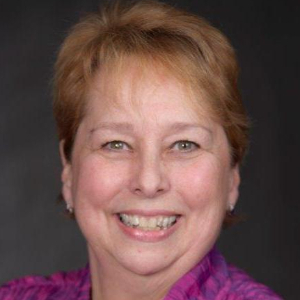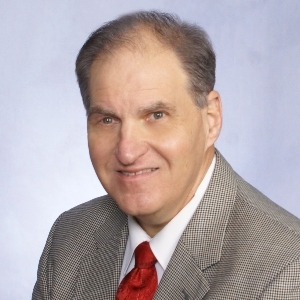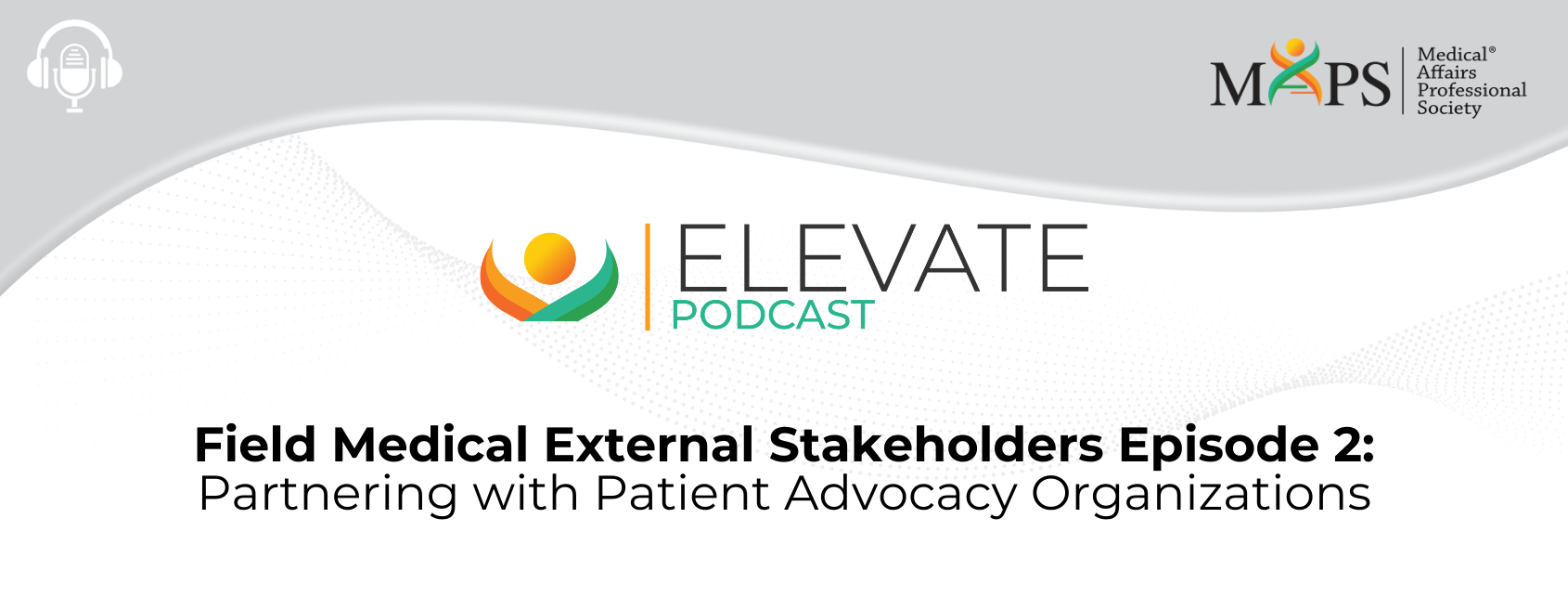Field Medical External Stakeholders: Partnering for Today and Tomorrow – Episode 2 Partnering with Patient Advocacy Organizations
Objectives:
At the end of this series of podcasts, the participant will be able to:
- Discuss the functions and activities of key external stakeholders
- Identify potential areas for compliant collaboration by MSLs with Patient Advocacy Groups

MODERATOR: Kathryn Gann, PhD

INTERVIEWER: Karen Shopmyer

INTERVIEWEE: Len Valentino, MD
Following is an automated transcription provided by otter.ai. Please excuse inaccuracies.
Kathryn Gann 00:00
Welcome to the Medical Affairs Professional Society Field Medical Focus Area Working Group’s podcast series, entitled “Field Medical External Stakeholders: Partnering for Today and Tomorrow”. In this second podcast, we will discuss partnering with patient advocacy groups. I’m Kathryn Gann. I’m a member of the Field Medical Focus Area Working Group and I’m the moderator for this podcast. Currently, I’m an independent consultant in Medical Affairs having spent my 30-year career as an MSL, an MSL manager, and an MSL trainer. Our legal disclaimer is as follows. The views expressed in this recording are those of the individuals and do not necessarily reflect on the opinions of MAPS, or the companies with which they are affiliated. This presentation is for informational purposes only and is not intended as legal or regulatory advice. We encourage you to engage in conversations about field medical with other MAPS members via MAPS Connect on the MAPS website or mobile app. Simply login with the email address and password associated with your MAPS account and access the global community. Then click on the discuss tab and scroll down the field medical subject area to post a question or to review previous postings. The objectives for this series of podcasts are that at the end of this series, the participant will be able to one, discuss the functions and activities of key external stakeholders, and two, identify potential areas for compliant collaboration by MSLs with those key external stakeholders. I’d like to thank today’s panelists for sharing their subject matter expertise with the MAPS audience. Speaking today are Karen Shopmyer, National Account Director at Amplity Health. And Karen is a member of our Field Medical Focus Area Working Group, and she’s going to be our interviewer. And Leonard Valentino, Chief Executive Officer at the National Hemophilia Foundation. Len’s our interviewee, and I’ll also add that he’s actively involved in MAPS as a member of the Patient Centricity Focus Area Working Group. Karen, let me turn this over to you and could you kick us off by briefly providing some information about yourself?
Karen Shopmyer 02:23
Absolutely. Hello, everyone. My name is Karen Shopmyer, and it’s a pleasure to be with you. I’ll be dating myself by sharing the I’ve actually been in industry since 1997. But for the past four years, I’ve been with Amplity health. I’m currently the National Account Director for Medical Solutions. But prior to this, I lead field based medical teams including diagnostic liaison teams, clinical trial liaison, and medical science liaison teams. Len, would you like to share a quick background?
Len Valentino 03:00
Sure. Thank you, Karen. I’m Len Valentino. I’m currently the President and Chief Executive Officer at the National Hemophilia Foundation. I’m a Pediatric Hematologist Oncologist by training and practiced for 25 years at an academic medical center in Chicago, Illinois. I retired from clinical practice in 2012. And in 2013, joined industry, first at Baxter Healthcare. Then at Baxalta, as the head of the Hematology Franchise, then at Shire in the same capacity. I left Shire and joined Spark Therapeutics in 2017, where I was working on developing gene therapy for people with hemophilia. In 2020, I joined the National Hemophilia Foundation and hit my current role for the last 18 months. I’m happy to be here today.
Karen Shopmyer 03:55
Thank you, Len. So, to get started, can you tell me what the National Hemophilia Foundation does?
Len Valentino 04:05
The National Hemophilia Foundation was founded in 1948 by the parents of a child with hemophilia because there was really no support that was available to them at that time. The only treatments in 1948 were blood transfusions, and the life expectancy for a person with hemophilia was around 20 years of age. Today, the National Hemophilia Foundation serves people across the US with all bleeding disorders, including not just hemophilia, but also Von Willebrand disease, rare factor deficiencies, platelet disorders, and vascular disorders. We do this through a network of 53 chapters across the country and in our territories. We provide education and support to people and families with bleeding disorders and advocate for improvements and access to care. Stakeholders include the people who live with these disorders, people that we’re now calling subject matter experts because of their lived experience…health care professionals, federal partners, and industry partners. Our interactions with industry traditionally have followed a model where the patient advocacy organization works with the advocacy function within a company.
Karen Shopmyer 05:24
Well, thank you for sharing that, Len. Now, we talked about how they typically interact. But would you also mind sharing how your organization has been looking to change that?
Len Valentino 05:35
Yes, thanks, Karen. So, the National Hemophilia Foundation, like many other advocacy organizations, have more scientific and medical leadership in their executive office positions. And this direction in advocacy organizations, I think, is important and requires some change in the way that we interact with our industry partners. As I said, the typical interaction historically has historically been with the patient advocacy function in a company. But what we’re trying to do is broaden that interaction to offer more value and make it more of a strategic partnership with their company. Clearly, a need for more high-level interaction that can’t be delivered just from the patient advocacy perspective, as it has been in the past can be so much more meaningful. So, what I mean by that is, I think the medical team needs to complement what patient advocacy does. The advocacy function can still be the owner of the relationship. But I think it’s supplemented, as I said, with Medical Affairs, clinical operations, regulatory, and others to bring the voice of the patient into the companies.
Karen Shopmyer 06:52
Wonderful. Well, with that broader focus, what are your goals for these interactions.
Len Valentino 06:59
So, our goal is really to change the nature of these relationships and interactions. In the past, there’s been a transactional type of approach. We’re in this together now in more of a partnership to advance the health and wellbeing of people with whatever disorder that advocacy function is supporting. So, for example, in our case, it’s the people with bleeding disorders. So, when we partner with companies, we’re looking for more of a strategic partnership. We want to say well, for example, in the past, you gave us $100,000 to do a program. But what we want to do is we want to collaborate now for the long term, create a partnership where the benefits are mutual to the organization, but also to the industry partner. This more strategic relationship more of a strategic partnership, I think is beneficial for the patient community and really helps to ground the company more in a patient-centric approach. Having that patient’s voice be included in all of their work.
Karen Shopmyer 08:13
I love that, Len. Thank you so much for sharing. Let’s transition and talk about your understanding of the role of MSLs.
Len Valentino 08:23
So, MSLs, you know, I’ve had the opportunity to interact with MSLs both in my academic capacity when they were calling on me, but then also in developing strategies for MSLs to utilize while in a company. So, I think the first thing is MSLs provide medical information. They provide clinical updates. But in this, this interaction has to be bi-directional. They’re out in the field to collect the insights, but they also have to be available to provide education and information to the stakeholders on various aspects of the products that they’re supporting. I think a good way for MSLs to partner is with scientific presentations to make sure that organizations have the latest and most recent information that’s available. And MSL can serve as a conduit to other parts of the organization. For example, they may need to bring in broader representation from the medical team or the clinical development team. Another good example of this is raising awareness in terms of clinical trials. We’ve helped with recruitment into clinical trials by raising the awareness in the patient community about their clinical trial and the important gap in care. It’s important to recognize that patient advocacy organizations really don’t have patients as their stakeholder in our organization. This is why we’ve really moved to term these individual subject matter experts to elevate them to a similar level that you might consider a medical SME. These individuals can share their stories with us. And in aggregate, we can represent the views of those subject matter experts to the companies. I think it’s also important that we recognize that they’re the experts in their own disease. They live with these diseases on a daily basis. So, it’s their shared lived experience that’s so important, and so vital for insights for the MSL. We can provide the MSLs with those insights. We can talk about medical needs and gaps in care. We can importantly, transmit the patient experience and the use case for medications and devices, as well as the acceptability of those drugs and devices and their impact on patients. For example, reporting of adverse events.
Karen Shopmyer 10:52
Wonderful, thank you for sharing. Now, how frequently you interact with MSLs?
Len Valentino 10:58
Oh, that’s, that’s a great question. And I think at least quarterly is necessary.
Karen Shopmyer 11:04
And when you think about your vast experience working with MSLs, what in your mind differentiates a great MSL from an average one?
Len Valentino 11:17
A great MSL has the ability to listen, and then reflect back. Listening versus just talking. Bad MSLs are ones who talk too much. They aren’t there to pontificate to the subject matter expert, the physician, nurse, or other health care professional, they should be there to assess the needs of the healthcare professional, and then fill those gaps as necessary. So, I really think an important quality for an MSL is the ability to listen, and then reflect back.
Karen Shopmyer 11:51
Great, thank you. You know, earlier, Len, you spoke about changing the relationship from a transactional one to a strategic partner, could you share any best practices around how MSLs and field medical partnerships could do that?
Len Valentino 12:08
So, I think a best practice always starts with having a relationship. Both parties, the MSL and the subject matter expert, or in this case, the advocacy organization need to understand what the intent of the other is, where they’re coming from. And this requires listening. I think great examples of how working with industry can happen is regular meetings with companies. We have regular partnership meetings with companies that we interact with, including with their clinical development team, their Medical Affairs team, and oftentimes with regulatory, as well as commercial and patient advocacy functions. The mission of the organization for us is research, education and advocacy. Talking with our industry partners, and having the right conversation with the right people, helps them understand what our goals and objectives are. So, our strategic partnerships, involve working with the companies where we present our strategic plan, and then have them present their strategic objectives to us. We look for synergies and ways to collaborate. It’s not just a one-off conversation. We want to do this for the long term. So, it’s important that we convey our long-term plans to the other partner in this relationship.
Karen Shopmyer 13:31
Wonderful, it sounds like you’re looking for the win-win, where the patient ultimately wins. What advice do you have for the MSLs here today?
Len Valentino 13:42
Yeah, my closing word of wisdom is to listen to the subject matter experts. It cannot be emphasized more than an MSL is out there, really to listen and to determine what the needs of that subject matter expert are, and then bring that information, whether it’s education, or information around a clinical trial to that subject matter expert.
Karen Shopmyer 14:05
Thank you so much, Len, for your great insights today. Kathy, I’ll turn it back to you now.
Kathryn Gann 14:13
Thanks, Karen. And I want to thank Len for his insight. I have to admit it really resonated with me, Len, when you use the word conduit, because 30 years ago, when I interviewed for my first MSL job, it was described as being a conduit of information, meaning that we disseminated information, but we also gathered insights and brought it back into the company. So, when you use that word, I was like, that’s just great, because that’s what the MSL job really should be. And I also want to thank you for giving us such a great overview of patient advocacy organizations and how Medical Affairs and MSLs can strategically collaborate with your group and other groups like yours. So, I think our audience should have a much better understanding now of the role and responsibilities of patient advocacy organizations, and how they can work with those organizations. So, this has been the second podcast in our series on the topic of Field Medical External Stakeholders Partnering for Today and Tomorrow. If you’re a MAPS member, thank you for your support of MAPS. If you’re not yet a MAPS member and would like access to additional resources in this area, please visit the MAPS website to explore joining and that is MedicalAffairs.org/membership. This concludes the podcast.






